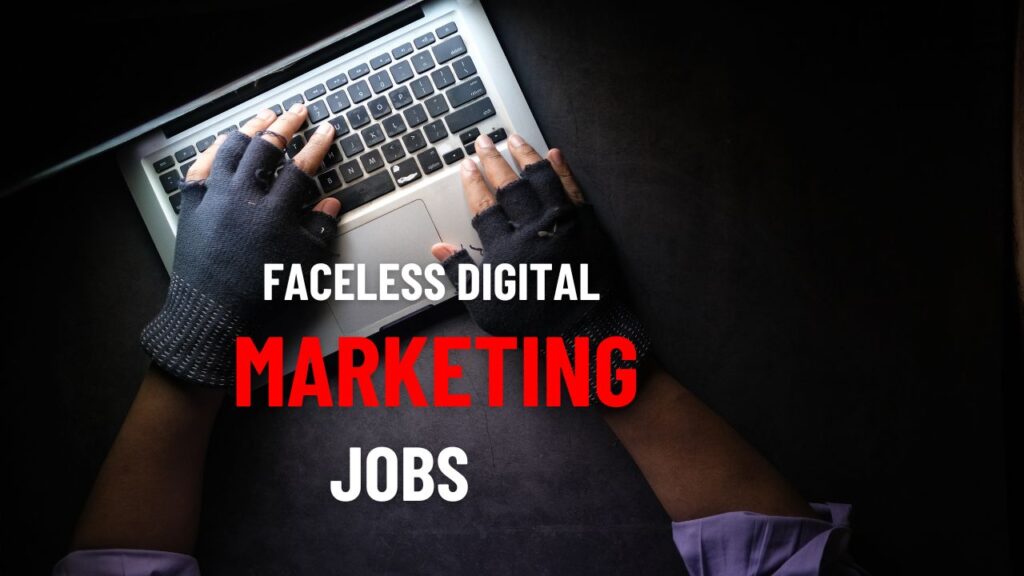In the fast-paced world of digital marketing, there are a variety of roles that don’t necessarily require a face to face interaction These faceless digital marketing jobs play a crucial role in the success companies and brands online. Let’s take a closer look at 10 of these roles.
what is faceless digital marketing
Faceless digital marketing is a strategy that focuses on promoting products or services without relying on the personal brand or identity of an individual. In this approach, the emphasis is placed on the brand itself and its offerings rather than any specific individuals associated with the marketing campaign. This can be particularly beneficial for businesses that want to maintain a level of anonymity distance between their brand and the individuals behind it.
Benefits of faceless digital marketing
One of the key benefits of faceless digital marketing is that it allows businesses to establish a strong and consistent brand identity. By focusing on the brand itself rather than individual personalities, companies can create a cohesive and recognizable image that resonates with their target audience. This can help to build trust and credibility with consumers, leading to increased brand loyalty and long-term success.
Another advantage of faceless digital marketing is that it can help businesses to avoid the pitfalls of relying too heavily on individual personalities. In today’s digital age, influencers and celebrities can quickly fall out of favor, leaving businesses vulnerable to sudden shifts in public opinion. By maintaining a faceless approach, companies can reduce the risk of being negatively impacted by the actions or behaviors of specific individuals.
Challenges of faceless digital marketing
While faceless digital marketing can offer numerous benefits, it also presents some challenges. One potential drawback is that it can be more difficult to establish a personal connection with consumers when there is no individual face or personality associated with the brand. This can make it harder to build relationships and engage with customers on a deeper level.
Another challenge of faceless digital marketing is that it can be challenging to stand out in a crowded marketplace. Without the appeal of a well-known personality or influencer, businesses may struggle to capture the attention of their target audience and differentiate themselves from competitors. This means that companies using a faceless approach may need to work harder to develop creative and compelling marketing strategies that resonate with consumers.
Faceless marketing Jobs
1. SEO Specialist
An SEO specialist is responsible for optimizing a website’s content and structure to improve its visibility on search engines Google. This role requires a deep understanding of algorithms and keyword research, making it crucial for driving organic traffic to a website.
2. Content Marketer
Content marketers are tasked with creating valuable and engaging content for a company’s online platforms, such as blogs, social media, and email campaigns. They play a vital role in attracting and retaining customers through storytelling and relevant information.
3. PPC Specialist
Pay-per-click specialists manage online advertising campaigns, ensuring that ads are targeted to the right audience and optimized for maximum ROI. This role requires analytical skills and a keen eye for detail to continuously improve campaign performance.
4. Email Marketer
Email marketers craft and execute targeted email campaigns to nurture leads and drive sales. They analyze data to optimize open rates and click-through rates, making them essential for building and maintaining customer relationships.
5. Social Media Manager
Social media managers oversee a company’s presence on various social platforms, creating and curating content to engage followers and grow brand awareness. They monitor trends and conversations to keep the brand relevant in the digital space.
6. Data Analyst
Data analysts track and analyze performance metrics to provide insights into the effectiveness of digital marketing campaigns. They use tools like Google Analytics to measure KPIs and make data-driven decisions to improve strategies.
7. UX Designer
User experience (UX) designers focus on creating seamless and intuitive website experiences for visitors. They conduct user research and testing to optimize website navigation and functionality, ultimately improving conversion rates.
8. Marketing Automation Specialist
Marketing automation specialists utilize software platforms to streamline and automate marketing processes, such as email campaigns and lead nurturing. They create workflows and triggers to deliver personalized content to targeted audiences.
9. Conversion Rate Optimizer
Conversion rate optimizers analyze website data to identify areas for improvement in the user journey, with the goal of increasing conversions. They conduct A/B testing and implement strategies to enhance website performance.
10. Digital Marketing Manager
Digital marketing managers oversee a team of specialists to develop and execute comprehensive digital marketing strategies. They set goals, track performance, and make strategic decisions to drive business growth and achieve marketing objectives.
Conclusion
In conclusion, these faceless digital marketing jobs are essential for the success of businesses in the online landscape. Each role plays a unique and critical part in reaching and engaging target audiences, driving traffic and conversions, and ultimately contributing to the growth and success of the company. Digital marketing professionals with these skills and expertise are in high demand as companies continue to prioritize their online presence and marketing efforts.



